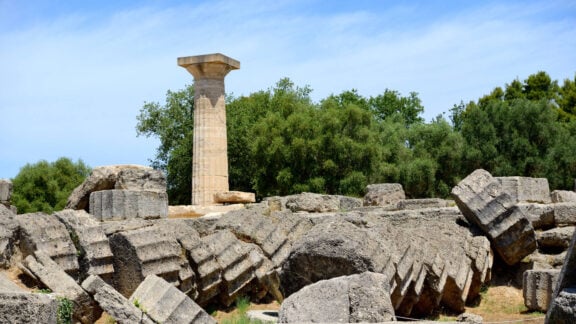Professor Nikos Papastergiadis wants to refresh the meaning of cosmopolitanism by examining the ways ancient philosophers and modern artists relate to the cosmos.
Papastergiadis’s new book, ‘The Cosmos in Cosmopolitanism,’ will be launched in late April.
It is a personal reflection on how, as a thinker, he ignored the cosmos—something that our ancient philosophers and artists never did as they navigated their relationship with the universe.
In a chapter from the book published in Neos Kosmos, Papastergiadis writes: “After completing my book Cosmopolitanism and Culture (2012), I had the realisation that in my efforts to reimagine the polis, I had taken the cosmos for granted.”
Baby Boomers may associate the ‘cosmopolitan’ with hairdressers, disco, and ritzy hotels from the mid 1970s to the mid 1980s. Even a cocktail was even named Cosmopolitan and term became an intangible brand denoting worldly sophistication – real and perceived.
Papastergiadis makes a startling confession in his book. The German and French philosophers he admired ‘were all products of an education in which Greek philosophy was like a first language.’
‘In a strange way, the fact that the classics were excised from my education made me feel doubly excluded. I was not alone in this uneasy relationship with the legacy of Hellenism,’ he writes.
Papastergiadis, in his book, critiques how an untethered global free market through globalisation – in full force by the late 20th Century –
“Cosmopolitanism is commonly associated today with the idea that the forces of globalisation could be tempered by new forms of cosmopolitan governance, an idea that seems increasingly unrealistic today,” said Papastergiadis.
Rather than dumping cosmopolitanism, Papastergiadis wants to reinvigorate it by examining how artists have explored themes associated with the cosmos.
“Artists claim that all humans possess a fundamental capacity to care, create and connect,” he told Neos Kosmos.
“Some artists argue that this creative capacity is linked to a dual connection—companionship with others and with the cosmos.”
The Ancient Greeks claimed that tuning in to the cosmos “was the primal source of inspiration” he said.
The German philosopher Immanuel Kant in the 18th Century, Papastergiadis said, “saw cosmopolitanism as the goal for humanity.”
“Kant later turned his attention away from the connection to the cosmos and directed it towards the practical rules for peaceful co-existence.”
The author added that “these two concerns are not in conflict”.
“Today a new vision of the cosmos is being developed by artists among others, one that brings together the cosmos and the polis.
“Scholars from the South are decolonising the mindset which divided the world and split us from our common connections, while others are using art to highlight the existential threats we now face as a species,” said Papastergiadis.
Papastergiadis argues for a “distinctive form of aesthetic cosmopolitanism” in his new book.
“The idea of the cosmos is more important than ever today and vital for our attempts to rethink our place as one species among others in a universe that extends far beyond our world,” Papasergiadis said.
The book launch of ‘The Cosmos in Cosmopolitanism’ by Prof. Nikos Papastergiadis: April 24 at 6:30 pm at the Mezzanine Level of the Greek Centre 168 Lonsdale St. Melbourne.









